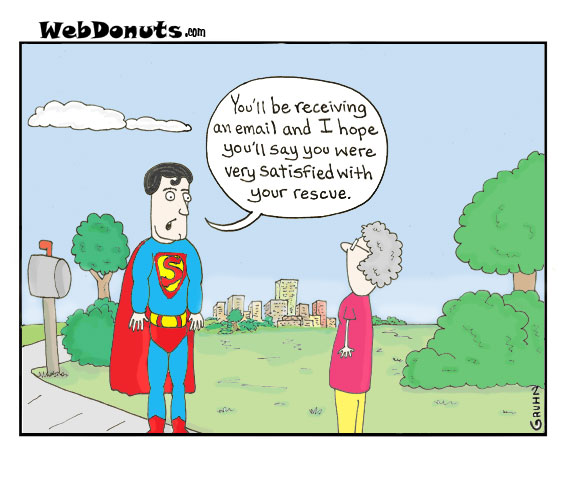Stop and think about this for a second: there are some strong “thought leadership” brands out there in different verticals. Even though businesses tend to make decisions based on market forces or economics or finance, you still see leaders and managers go to conferences and read white papers — and these thought-brands have the ability to shape how people are thinking about concepts or ideas. (Maybe at a low level, but still.) As such, here’s an article on Forrester’s called “Become customer-obsessed or fail.”
I assume most people in management/leadership roles already think this way: it’s all about customer customer customer and customer is always right and damn, chase those customer leads and all that. That is the prevailing mentality, and there’s nothing wrong with that on surface. Customers buy your wares and, in turn, make you money. You could do worse than focusing on their happiness and “pain points” and all that. I don’t disagree.
There’s a problem, though.
Managers are busy people, and, honestly? They’re often not very good at their jobs. By some measure and in many orgs, a lot of these things are true for the rank-and-file:
- Managers don’t know their strengths.
- Managers aren’t invested in their careers.
- Managers don’t have time to respect them.
- Managers often aren’t clear about their expectations for them.
- Managers almost never walk around and actually talk to them.
- Managers think “accountability” is a synonym for “screaming at someone.”
I could go on, but I won’t.
So here’s the situation you’re creating in the modern age:
- A lot of thought leadership is about please the customer please the customer please the customer.
- Senior management hears that, buys in, and kicks that down to their execution level (middle management).
- A game of telephone ensues, and middle managers — so slammed as is, right? — keep hearing customer customer customer as a deliverable, so they put all their attention there.
- That’s less attention on the actual employees sitting in front of the manager.
- “Well, I don’t have time for that problem right now, Pete. We need to get out in front of this customer issue!”
- This is only going to extend the central problem of modern-era work — we respond to customers every second, and evaluate/respond/give feedback to our own employees about once a year.
I thought about this once before, when LinkedIn rolled out a “content marketing score” and orgs were rushing in left and right to get all their people active on LinkedIn. “It’ll be a great recruiting tool!” Etc. You know the flip side? You take someone who barely uses LinkedIn and tells them to use it? They’re suddenly exposed to different opportunities, other companies, other ways of thinking, other recruiters, etc. So you gain a “content marketing score” but maybe lose a high-performing employee? Not great.
In sum, I love the idea that the customer should be the focus. About 40 times a week, I’m a customer. And I’m a selfish bastard, so I love being the focus. But as an employee, meh. The more and more people around me keep thinking it’s all customer customer customer, the less they’ll pay attention to me, my ideas, ways that I could contribute, etc. That’s less good.
If we’re really in “The Age of the Customer” and companies are totally fine keeping earnings down, you could see a lot of employee frustration ultimately lead to “The Age Of Job-Hopping.”

This has been the prevalent construct for ~ 25 years already, but even back then, Forrester stole this from Patti Seybold. In fact, Patti is really the one who started this customer-centered operation thing back then (which I continue to support) Unfortunately, employees have gotten the short end of the stick ever since.. Lord knows, management certainly hasn’t done anything but take credit and value out of both the custmer and the employee counterparts since then. About 10 years ago, this was the backdrop that made the whole Zappos story so remarkable. Tony Hsigh and his Zappos operation actually grew wildly ($1B+) by turing this triad into servant leaderhip supporting well-treated employees empowered to provide for the customer. At the time, the business community was in awe ($1B+), but somehow, with very few exceptions, management’s greed in the interviening years has left the all the over-burduned employees holding the blame for poor customer service in nearly every other indiustry/company since. Management??!!?? Ya… Management.
From my view, “customer-centric” means pandering to people and telling them what they want to hear–ahem, you know, marketing. If a company does its job right, the result should automatically be a happy customer AND employees.
LOL.
I’m so jaded…
We both are.
Reblogged this on Gr8fullsoul.